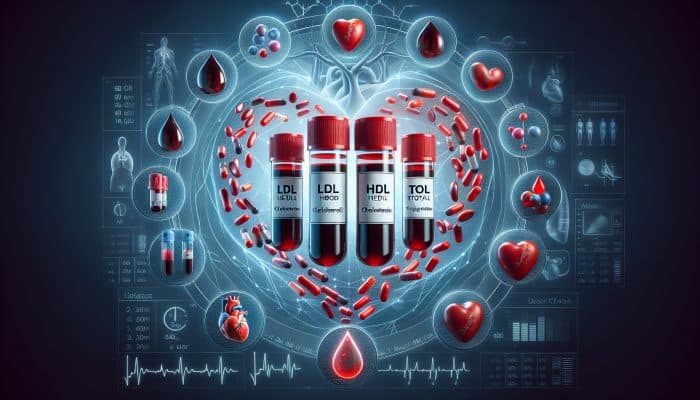Your In-Depth Resource for Understanding Cholesterol Blood Tests in Brighton
Why Is It Crucial to Have a Cholesterol Blood Test?

The Cholesterol Blood Test in Brighton is an essential diagnostic procedure that meticulously assesses the levels of cholesterol and triglycerides in your bloodstream. This vital examination offers significant insights into your cardiovascular health and helps evaluate your risk for developing serious heart diseases. By analysing these lipid levels, healthcare professionals can pinpoint potential health threats and suggest necessary lifestyle modifications or treatment strategies. The test includes several cholesterol categories, such as:
- Low-Density Lipoprotein (LDL) – Often dubbed ‘bad’ cholesterol; elevated levels can cause plaque build-up in arteries, thus increasing the risk of heart disease.
- High-Density Lipoprotein (HDL) – Referred to as ‘good’ cholesterol, HDL plays a vital role in transporting cholesterol away from arteries to the liver for processing.
- Total Cholesterol – This measurement reflects the overall cholesterol content in your blood, taking into account both LDL and HDL levels.
- Triglycerides – A type of fat present in the blood; heightened levels can also pose significant health risks.
Understanding the implications of these cholesterol components is essential for assessing your heart health and determining any necessary interventions should irregularities occur.
What Steps Should You Take to Prepare for Your Cholesterol Blood Test?
Proper preparation for a cholesterol blood test is imperative for obtaining accurate results. Generally, you will be advised to fast for 9-12 hours before the test, meaning you should avoid all food and beverages apart from water. Your healthcare provider may offer specific instructions tailored to your individual health status, including whether to continue taking your regular medications. It is crucial to verify these details during your appointment to ensure the accuracy of your test outcomes.
In addition to fasting, it is advisable to avoid strenuous exercise the day before your test, as physical activity can temporarily affect your cholesterol levels. By following these preparatory recommendations, you can improve the reliability of your cholesterol assessment, thereby providing your medical team with a clearer picture of your health condition.
How to Effectively Interpret Your Cholesterol Test Results?
Upon receiving your cholesterol blood test results, comprehending their significance is vital for making informed health-related decisions. Typically, results are categorised into three main classifications: normal, borderline high, and high. A normal total cholesterol level is generally considered to be less than 200 mg/dL, while borderline high falls within the range of 200-239 mg/dL, and high is defined as anything above 240 mg/dL. LDL levels are particularly important, with optimal values being less than 100 mg/dL. For HDL, levels exceeding 60 mg/dL are recognised as protective against heart disease.
Understanding these classifications can significantly impact your health decisions. For example, if your cholesterol levels are in the borderline or high categories, it may encourage you to consider making lifestyle changes such as adjusting your diet and increasing physical activity, or in some cases, commencing medication. Always consult your GP to devise a personalised action plan that prioritises your cardiovascular well-being.
When Is the Ideal Time to Schedule Your Cholesterol Blood Test?

Adults are typically advised to undergo a cholesterol test every 4-6 years as part of their routine health assessments. However, the frequency of testing may vary based on individual risk factors. If you have a history of heart disease, diabetes, or other cardiovascular risk factors, more frequent testing may be recommended. Your GP will provide personalised guidance based on your health profile and family history, carefully considering these critical factors when determining your need for regular cholesterol evaluations.
For younger adults, particularly those without risk factors, initial testing is usually suggested by age 20. This proactive approach aids in the early detection of potential issues, allowing for timely lifestyle adjustments or interventions to prevent future health complications. Always engage in discussions with your healthcare provider to establish an appropriate cholesterol testing schedule tailored to your specific circumstances.
Insights from Experts on Cholesterol Blood Tests in Brighton
What Should You Expect During Your Cholesterol Blood Test?
When you attend a cholesterol blood test appointment, you can anticipate a straightforward procedure primarily involving a simple blood draw, typically taken from your arm. This process is swift, often completed in just a few minutes, and is generally painless. Many patients describe the experience as involving only a slight pinch during the needle insertion, with limited discomfort. For instance, a recent patient named Sarah recounted her experience at a local Brighton clinic, stating, “I was apprehensive at first, but the nurse was incredibly reassuring; it was over before I realised it.” This sentiment echoes the common experiences of patients, as compassionate healthcare professionals are present to guide you through the process.
Once the blood is drawn, the sample is sent to a laboratory for analysis. You can generally expect to receive your results within a few days to a week, providing you with valuable insights into your cholesterol levels and their implications for your health. Knowing what to expect can significantly reduce anxiety, making the entire experience more manageable and reassuring.
How Frequently Should You Schedule Cholesterol Testing?

The frequency of cholesterol testing is primarily determined by your age, overall health, and family history. For most adults, a common recommendation is every 4-6 years, but if you have specific risk factors—such as a personal or family history of heart disease, diabetes, or high cholesterol—your GP may recommend more frequent testing. For individuals under 40 who do not exhibit risk factors, less frequent testing may be adequate. Conversely, those with elevated cholesterol levels or other health concerns may require annual testing or even more frequent evaluations.
Your GP will provide tailored recommendations based on your health profile, ensuring your testing schedule aligns with your unique needs. By remaining proactive and adhering to your testing schedule, you can more effectively manage your cholesterol levels and reduce the risk of heart disease.
Where Can You Access Cholesterol Testing Services in Brighton?
Brighton offers a plethora of facilities where you can undergo a cholesterol blood test, ranging from GP surgeries to private clinics. To arrange an appointment, begin by contacting your local GP practice, as they may provide cholesterol screening as part of routine health assessments. Alternatively, private clinics such as the Brighton Physiotherapy Clinic or Nuffield Health Brighton Hospital also offer cholesterol testing services. These facilities often provide more flexible hours and may deliver quicker results.
To schedule an appointment, you can either call the facility directly or visit their website. Having your NHS number available can expedite the registration process. Many clinics also offer online booking options, saving you time and enhancing convenience. Ensure you verify the costs associated with private tests if you are not utilising the NHS, as prices may vary. This proactive approach will greatly facilitate your journey towards optimal heart health.
How to Clearly Understand Your Cholesterol Test Results?
Interpreting your cholesterol test results is crucial for making informed health decisions. Your report will typically display values for total cholesterol, LDL, HDL, and triglycerides, alongside reference ranges for each. Ideally, LDL, or ‘bad’ cholesterol, should remain below 100 mg/dL, while HDL, the ‘good’ cholesterol, should exceed 60 mg/dL for optimal cardiovascular protection. Total cholesterol levels below 200 mg/dL are generally regarded as healthy.
Upon receiving your results, it is important to approach them with a clear understanding of their implications. For instance, if your LDL levels are elevated, this may indicate an increased risk for heart disease, prompting a discussion with your GP regarding potential lifestyle modifications or treatments. Similarly, if your HDL levels are low, your doctor might suggest dietary changes aimed at increasing healthy fats, such as those found in avocados and nuts. Being well-informed about what each component signifies empowers you to actively participate in discussions with your healthcare provider, allowing you to take charge of your health journey.
The Critical Role of Regular Cholesterol Testing
How Regular Testing Facilitates Early Detection of Health Risks?
Regular cholesterol testing is essential for identifying potential health risks early on. By continuously monitoring your cholesterol levels, you can detect high cholesterol before it develops into more severe conditions, such as heart disease or stroke. Early detection paves the way for timely interventions, which may include lifestyle modifications or medication to mitigate risk. Conditions associated with high cholesterol include:
- Coronary artery disease – A leading cause of heart attacks.
- Stroke – High cholesterol can contribute to atherosclerosis, leading to blockages in blood vessels.
- Peripheral artery disease – Insufficient blood flow to the limbs may cause pain and mobility issues.
- High blood pressure – Often associated with elevated cholesterol levels.
By maintaining vigilance and scheduling regular cholesterol tests, you take control of your heart health, ultimately promoting a longer, healthier life. Early intervention strategies can substantially lower the risk of developing these serious conditions, making routine testing an indispensable aspect of preventive healthcare.
How to Assess the Effectiveness of Your Cholesterol Treatment?
If you are currently undergoing treatment for high cholesterol, whether through lifestyle changes or medication, regular testing is essential in monitoring the effectiveness of your treatment plan. By tracking your cholesterol levels over time, your healthcare provider can determine whether your current approach is yielding positive outcomes or if adjustments are necessary. For instance, if your LDL levels remain elevated despite implementing lifestyle modifications, your doctor may suggest a different medication or stricter dietary changes.
Moreover, regular testing provides a tangible way to observe the results of your efforts, whether you’re adhering to a heart-healthy diet or increasing your physical activity. Many patients find motivation in witnessing improvements in their cholesterol levels, reinforcing their dedication to a healthier lifestyle. This ongoing dialogue with your healthcare provider ensures that your treatment remains effective and tailored to your specific health needs.
What Lifestyle Changes Can Help Lower Cholesterol Levels?
Making informed lifestyle changes can dramatically influence your cholesterol levels and overall cardiovascular health. Effective strategies include adopting a heart-healthy diet, engaging in regular physical activity, and quitting smoking. Here are some expert-recommended insights:
- Healthy Eating – Focus on a diet rich in fruits, vegetables, whole grains, and lean proteins while minimising saturated and trans fats.
- Regular Exercise – Aim for at least 150 minutes of moderate-intensity exercise each week to enhance HDL levels.
- Weight Management – Losing even a small amount of weight can significantly improve cholesterol levels.
- Limit Alcohol Consumption – Moderation is key; excessive drinking can adversely affect cholesterol levels.
By incorporating these lifestyle modifications, you can positively affect your cholesterol levels and diminish the risk of heart disease. Consulting a healthcare provider for personalised guidance and support throughout this journey is critical, as they can offer recommendations based on your individual health profile.
What to Anticipate During the Cholesterol Testing Process?
What Happens During Your Cholesterol Test Appointment?
Upon arriving for your cholesterol blood test appointment, you will engage in a brief consultation with a healthcare professional. This appointment typically involves discussing your health history, any medications you are currently taking, and what to expect during the test. Following this discussion, a blood draw will be performed; the healthcare provider will cleanse the area with an antiseptic wipe and insert a needle into a vein in your arm to collect your blood sample.
This procedure is generally quick, taking only a minute or two. Once the sample is taken, it is sent to a laboratory for analysis. The entire process is designed to be efficient and minimally invasive, allowing you to resume your daily activities shortly after the test. For individuals who may feel anxious about needles, it’s wise to communicate this with the healthcare professional, as they can often provide techniques to help ease your nerves during the procedure.
How Long Will You Wait for Your Results?
After your cholesterol blood test, the time it takes to receive your results may vary based on several factors, including the laboratory’s workload and the specific protocols of your healthcare provider. Typically, results are available within a few days to a week. Most clinics will contact you directly via phone or secure messaging to discuss your results, and some may even offer a patient portal for online access to your lab results.
Recognising that waiting for results can induce anxiety is important, so consider discussing any concerns with your healthcare provider during your appointment. They can provide insights into the typical timeframe based on their processes and what to expect during the waiting period. Should your results indicate high cholesterol levels, your doctor will arrange a follow-up appointment to discuss your options, ensuring you have a clear path forward regardless of the outcome.
What Actions Should You Take If Your Results Are Abnormal?
If your cholesterol test results are abnormal, it is crucial to engage in a follow-up discussion with your GP. Abnormal results typically indicate elevated levels of LDL or total cholesterol, which may necessitate further testing or lifestyle changes. After reviewing your results, your GP may recommend various next steps, including:
- Additional Testing – Further tests, such as a lipid panel or an evaluation of other cardiovascular risk factors, might be necessary.
- Lifestyle Changes – Implementing dietary and exercise modifications to improve your cholesterol levels.
- Medication – If lifestyle changes are insufficient, your doctor may prescribe cholesterol-lowering medications.
- Regular Monitoring – Scheduling follow-up tests to track your cholesterol levels over time.
Abnormal results do not automatically indicate a serious health issue; rather, they present an opportunity to take proactive steps toward improving your health. Open communication with your healthcare provider will help you comprehend your results and determine the best course of action moving forward.
What Should You Bring to Your Cholesterol Test Appointment?
Preparing for your cholesterol blood test appointment involves bringing certain items to ensure a smooth experience. Essential documents to have ready include your identification, NHS number, and any relevant insurance or payment information if applicable. It’s also prudent to bring a list of your current medications, including dosages and frequency, as these can impact your cholesterol levels and overall health. Furthermore, if you possess any recent medical records or notes from previous healthcare providers regarding your cholesterol or heart health, be sure to include those as well.
These preparations facilitate the appointment, allowing your healthcare provider to gain a comprehensive understanding of your health background. By arriving prepared, you can help ensure that the consultation is productive, leading to a more accurate assessment of your cholesterol and heart health.
Can You Eat Before a Cholesterol Blood Test?
Whether you can eat prior to your cholesterol blood test depends on the specific instructions from your healthcare provider. Many cholesterol tests require fasting for 9-12 hours, meaning you should avoid all food and drink except for water during this time. Adhering to these guidelines is crucial, as eating can temporarily alter your cholesterol readings, resulting in inaccurate outcomes. However, some tests may not necessitate fasting, so it is essential to clarify this point when scheduling your appointment.
If fasting is necessary, plan your last meal wisely to be light and easily digestible, steering clear of heavy, fatty foods that could skew results. Staying hydrated by drinking plenty of water is encouraged, as it can help maintain hydration and facilitate the blood draw. Following your doctor’s specific instructions will ensure that your cholesterol test results are reliable and actionable.
Strategies to Enhance Your Cholesterol Blood Test Experience in Brighton
How to Mentally Prepare for Your Cholesterol Test?
Feeling anxious about a cholesterol blood test is entirely normal; however, there are several strategies that can assist in managing that anxiety. Firstly, familiarising yourself with the process can alleviate fear; knowing that it’s merely a simple blood draw can transform the experience into a manageable endeavour. You can also practice relaxation techniques such as deep breathing or visualisation before and during the appointment. Taking a few moments to concentrate on your breathing, inhaling deeply and exhaling slowly, can help calm your nerves.
Another effective strategy is to bring along a supportive friend or family member. Their presence can provide comfort and distraction, helping to alleviate any feelings of anxiety. Additionally, consider bringing a book or listening to calming music while you wait. These simple steps can transform your experience from a daunting task into a manageable one, ensuring you feel more in control as you undergo your cholesterol blood test.
What Are the Best Practices for Post-Test Care?
After completing your cholesterol blood test, it is vital to adhere to best practices for post-test care to prioritise your health. Generally, you can resume your normal diet and activities unless advised otherwise by your healthcare provider. If you had to fast beforehand, consuming a healthy meal after your test is advisable, including foods that promote heart health, such as fruits, vegetables, and whole grains.
Moreover, scheduling a follow-up appointment with your GP to discuss your results is equally important, especially if they are abnormal. This conversation will help you understand the implications of your cholesterol levels and provide guidance on the next steps to take. Maintaining open communication with your healthcare provider, along with adhering to any lifestyle changes or treatments they recommend, will significantly contribute to your long-term health and wellness.
How to Select the Right Testing Facility?
Choosing the appropriate facility for your cholesterol blood test is crucial to ensuring a positive experience. Start by considering the location; select a facility that is conveniently situated, whether it’s your local GP surgery or a private clinic. Assessing the costs is also significant, particularly if you are contemplating private testing; inquire about fees upfront to avoid unexpected charges.
It’s prudent to check if your GP recommends the facility, as referrals from trusted sources often lead to better care. Look for facilities that boast positive patient reviews, as these can provide insights into the experiences of others. Additionally, consider the range of services offered; some clinics provide comprehensive cardiovascular assessments, which may be beneficial if you’re concerned about more than just cholesterol levels. By carefully evaluating these factors, you can identify a testing facility that meets your needs and delivers quality care.
What Foods Are Best to Consume Before the Test?
Before your cholesterol blood test, your dietary choices play a crucial role in ensuring accurate results. If fasting is required, it is essential to avoid all food and beverages, save for water, for 9-12 hours before your appointment. If fasting is not necessary, aim for a light meal that is low in fats and sugars, as heavy or fatty foods can temporarily elevate your cholesterol levels.
Focus on consuming whole foods, such as fruits, vegetables, and whole grains, which are less likely to skew your results. It’s also beneficial to remain hydrated by drinking water; this not only supports the blood draw process but also helps maintain overall health. Following your healthcare provider’s specific dietary instructions will ensure the best possible outcomes for your cholesterol test.
Clarifying Common Myths and Facts About Cholesterol
Is It True That All Cholesterol Is Harmful?
Not all cholesterol is harmful; in fact, your body requires cholesterol for various essential functions, such as constructing cell membranes and producing hormones. The key is to understand the different types of cholesterol. Low-Density Lipoprotein (LDL), often referred to as ‘bad’ cholesterol, can lead to plaque accumulation in arteries, thereby increasing the risk of heart disease. In contrast, High-Density Lipoprotein (HDL) is known as ‘good’ cholesterol because it aids in removing LDL from the bloodstream.
Maintaining a healthy balance between these types of cholesterol is vital. Elevated levels of HDL are associated with a lower risk of heart disease, while high LDL levels can adversely affect cardiovascular health. By emphasising lifestyle changes that elevate HDL and reduce LDL, you can positively impact your cholesterol profile and protect your heart.
Can Diet Alone Effectively Regulate Cholesterol Levels?
While diet plays a significant role in managing cholesterol levels, it is not the only determining factor in this process. Genetics, age, and overall lifestyle also play crucial roles in the levels of cholesterol present in your body. While a heart-healthy diet can help lower LDL cholesterol and raise HDL, additional factors such as physical activity and medical history must also be taken into account. Here are some dietary tips to incorporate:
- Increase Soluble Fibre – Foods like oats, beans, and fruits can help reduce LDL cholesterol.
- Incorporate Healthy Fats – Avocados, olive oil, and nuts can help raise HDL cholesterol.
- Limit Saturated and Trans Fats – These fats can elevate LDL levels; it’s advisable to avoid processed foods and fatty cuts of meat.
- Consume More Fish – Omega-3 fatty acids found in fish can help lower triglyceride levels.
While dietary changes can significantly influence cholesterol levels, it's crucial to consult with your healthcare provider about a comprehensive approach that may include medications, particularly if you have a family history of cholesterol issues or existing health conditions.
Do Children Require Cholesterol Testing?
Routine cholesterol testing is generally not recommended for children; however, it may be indicated in specific situations, especially if there is a family history of high cholesterol or cardiovascular disease. For children aged two and above, screening may be considered if their BMI is at or above the 85th percentile or if they have any other risk factors, such as diabetes or hypertension.
Early identification of cholesterol issues can enable timely interventions, potentially preventing future health complications. If your child falls into a high-risk category, consulting with a paediatrician about the necessity of cholesterol testing and the appropriate age to commence screening is essential.
Effectively Managing Cholesterol in Brighton
What Resources Are Available for Cholesterol Management in Brighton?
Brighton is home to an extensive array of resources for those looking to manage their cholesterol effectively. Local health services provide comprehensive support, including dietary guidance, fitness programmes, and smoking cessation assistance. The NHS Health Check programme, for instance, offers free health assessments for adults aged between 40 and 74, which include cholesterol testing as part of a broader heart health evaluation.
In addition to NHS services, Brighton has numerous dietitians and nutritionists who specialise in heart health. Many local community centres host workshops and classes focused on healthy eating and lifestyle changes. Exploring these resources can empower individuals to take control of their cholesterol levels and overall health.
How to Access Specialized Care for Cholesterol Management?
If you find that you require specialised care for your cholesterol management, your GP can refer you to a cardiologist or lipidologist in Brighton. These specialists possess advanced training in diagnosing and treating cholesterol-related conditions, ensuring you receive optimal care tailored to your specific needs.
During your referral appointment, the specialist will conduct a thorough assessment of your cholesterol levels, family history, and any other health concerns you may have. They may recommend advanced testing or treatment options, including medications or more intensive lifestyle interventions. Accessing specialised care enables you to optimise your approach to managing cholesterol and enhance your overall cardiovascular health.
What Support Groups Exist for Cholesterol Management?
Joining a support group focused on cholesterol management can provide invaluable encouragement and practical advice from others facing similar health challenges. In Brighton, there are various support groups and community programmes aimed at assisting individuals in managing their cholesterol and adopting healthier lifestyles. These groups often conduct regular meetings to discuss experiences, share strategies for managing high cholesterol, and offer emotional support.
Participating in these groups fosters a sense of community, enabling you to connect with others who understand the challenges and benefits of managing cholesterol levels. They may also provide access to resources such as workshops, guest speakers, and educational materials focused on heart health. Connecting with others not only enhances motivation but also offers a supportive network that can contribute to lasting lifestyle changes.
Common Questions Answered (FAQs)
What is a cholesterol blood test?
A cholesterol blood test measures the levels of cholesterol and triglycerides in your blood, assisting in assessing your risk of heart disease.
How often should I get a cholesterol blood test?
Adults should undergo a cholesterol test every 4-6 years, with more frequent testing recommended if they have risk factors like heart disease or diabetes.
Do I need to fast before a cholesterol blood test?
Yes, fasting for 9-12 hours is typically required before the test; however, please confirm this with your healthcare provider to ensure accuracy.
What occurs during the cholesterol blood test?
A simple blood draw is performed, usually from your arm, taking just a few minutes.
How long does it take to obtain results?
Results typically take a few days to a week, depending on the laboratory’s workload.
What are the normal cholesterol levels?
Normal levels are typically below 200 mg/dL for total cholesterol, with LDL below 100 mg/dL and HDL above 60 mg/dL.
Can lifestyle changes effectively lower cholesterol?
Yes, adopting a healthy diet, engaging in regular exercise, and maintaining a healthy weight can significantly impact cholesterol levels.
Are there any risks associated with high cholesterol?
High cholesterol can lead to serious conditions such as coronary artery disease, stroke, and peripheral artery disease.
Should children undergo cholesterol testing?
Routine testing is not usually recommended, but it may be advised for children with a family history of high cholesterol.
What resources are available for cholesterol management in Brighton?
Brighton offers a range of resources, including NHS Health Check programmes, dietitians, and community support groups dedicated to cholesterol management.
Connect with us on Facebook!
This Article Was First Found On https://bloodtest.co.uk
The Article Cholesterol Blood Test Guide for Brighton Residents Was Found On https://limitsofstrategy.com
The Article Cholesterol Blood Test Insights for Residents of Brighton found first on https://electroquench.com

